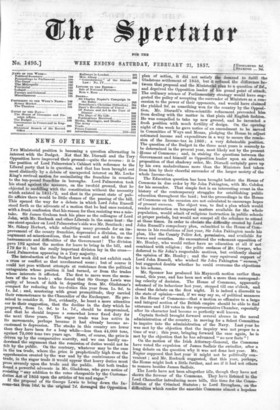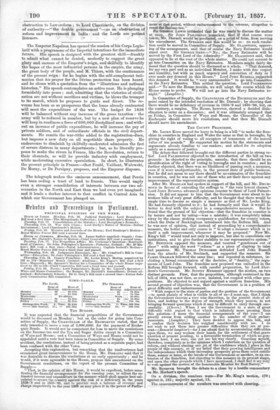NEWS OF THE WEEK.
THE Ministerial position is becoming a question alternating in interest with the Budget. Not that Mr. Disraeli and the Tory'
Opposition have improved their ground—quite the reverse : it is the position of Lord Palmerston's Cabinet with reference to the Liberal party that is in question, and that has been brought out most distinctly by a debate of unexpected interest on Mr. Locke King's revived motion for assimilating the franchise in counties to the ten-pound franchise in boroughs. Lord Palmerston took his stand against the measure, on the twofold ground, that he objected to meddling with the constitution without the necessity which existed in 1831-'2, and that in the present state of public affairs there would be little chance of the passing of the bill. This opened the way for a debate in which Lord John Russell stood forth as the advocate of a motion that he had once resisted, with a frank confession that his reason for then resisting was a mistake. Sir James Graham took his place as the colleague of Lord John, with Mr. Roebuck and other Liberals in the same boat : the one stout speaker on Lord Palmerston's side was Mr. Bentinok ; and Mr. Sidney Herbert, while admitting many grounds for an improvement of the county franchise, deprecated a division, on the argument ad misericordiam, that he would not add to the embarrassments and difficulties of the Government The division gave 192 against the motion for leave to bring in the bill, and 179 for it ; but the really important division lay in the cross— Lord Palmerston appearing in a Tory majority.
The introduction of the Budget last week did not exhibit such a cross or conflict as that unrehearsed scene ; but of course it could not pass without attempts at resistance from the political antagonists whose position it had turned, or from the trades whose interests it affected. The first to move were the members of the tea trade ; who found that Sir George Lewis was guilty, of breach of faith in departing from Mr. Gladstone's compact for reducing the tea-duties this year from 18. 9d. to is. 3d. ; and, mustering with great promptitude, they carried their remonstrance to the Chancellor of the Exchequer. He promised to consider it. But, evidently, he leant a more attentive ear to their suggestion, that the decline in the duty which he proposed, from 18. 9d. to 18. 7d., should be compromised, and that he should impose a somewhat lower fixed duty for the next three years. The sugar, trade was less active in its movements, perhaps because it had already become accustomed to depression. The stocks in this country are lower than they have been for a long while—less than 44,000 tons, against 73,000 tons two years ago. Here, of course, the price is driven up by the comparative scarcity, and we can hardly understand the argument that the remission of duties would not be felt by the public. On the contrary, whatever may be the case in the tea trade, where the price is prophetically high from the apprehension created by the war and by the contrivances of the trade, in the sugar trade it would appear that heavy duties must press severely upon the trade and the public. But both trades found a powerful advocate in Mr. Gladstone, who gave notice of resisting "any addition to the rates chargeable by the Customsduties Act of 1855 upon the articles of tea and sugar." If the proposal of Sir George Lewis to bring down the Income-tax from 16d. to the original 7d. deranged the Opposition plan of action, it did not satisfy the demand to fulfil the Gladstone settlement of 1853, but it reduced the difference between that proposal and the Ministerial plan to a question of 2d., and deprived the Opposition leader of his grand point of attack. The ordinary science of Parliamentary strategy would have suggested the policy of accepting the surrender of Ministers as a con
cession to the power of their opponents, and would have claimed the yielded 9d. as something won for the country by the Opposi tion. Mr. Disraeli's ultra-scientific refinement prevented him from dealing with the matter in that plain old English fashion. He was compelled to take up new ground, and he invented a fresh position with much fertility of design. On the opening night of the week he gave notice of an amendment to be moved in Committee of Ways and Means, pledging the House to adjust estimated income and expenditure in a way to secure the remission of the Income-tax in 1860; a very debateable position.
The question of the Budget in the three next years is scarcely to be determined in the present year, most likely not by the present ouse of Commons ; and, in staking the questions between the Government and himself as Opposition leader upon an abstract proposition of that shadowy order, Mr. Disraeli certainly gave up by his own maladroitness more than the Ministers had taken from him by their cheerful surrender of the larger moiety of the whole Income-tax.
The Education question has been brought before the House of Commons in due order by Sir John Pakington, with Mr. Cobden for his seconder. That simple fact is an interesting event in the history of the contemporary struggles for establishing public education throughout the land ; but the proceedings in the House of Commons on the occasion are not calculated to encourage hopes of present success. The object was, to find a plan which would. render instruction on temporal matters available for the whole population, would admit of religious instruction in public schools
at prbper periods, but would not compel all the scholars to attend at those times. In order to obviate the difficulty created by Lord.
John Russell's compulsory plan, submitted to the House of Com mons in his resolutions of last year, Sir John Pakington made his plan, like the County Police Act, permissive, nd available for towns and counties. He encountered the vehement opposition of
Mr. Henley, who would rather have no education at all if not combined with religion ; the polite coolness of Dir. Cowper, who
deferred to Sir John's respectable motives, but evidently shared the opinion of Mr. Henley ; and the very equivocal support of Lord John Russell, who wished Sir John Pakington "success," but suggested doubts whether he could. overcome the objections to his scheme.
Mr. Spooner has produced his Maynooth motion earlier than usual, this year, and has been met with a more than correspond ing celerity of decision. The House of Commons, apparently ashamed of its behaviour last year, stopped till one o'clock, and closed the debate on the first night. It is indeed a discredit to
the state of opinion—and, if we may say so, of political manners in the House of Commons—that a motion so Ofti3118iye to a large and integral section of the British empire should be able to find utterance and 159 votes in the representative Chamber, especially after its character had become so perfectly well known.
Captain Scobell brought forward several abuses in the naval administration of the country, in moving for a Select Committee to inquire into the administration of the Navy. Last year he was met by the objection that the inquiry was not proper to a time of war ; this year, bringing forward the ease again, he is met by the objection that he has advanced "no new facto" On the motion of the Irish Attorney-General, the Commons have voted the expulsion of James Sadleir the swindler, after a long debate on the question why it was not done last year. Mr. Napier supposed that last year it might not be politically convenient; and Mr. Roebuck suggested, that this year, perhaps, the House might look a little further, and see if it had not others to remove besides James Sadleir.
The Lords have not been altogether idle, though they have not shown the fervour of the Commons. They have listened to the Lord Chancellor introducing more bills, this time for the Consolidation of the Criminal Statutes ; to Lord Brougham, on the difficulties which render the anarchic Commons almost a hopeless obstruction to Law-reform ; to Lord Clanricarde, on the division of authority—"the double government "—as an obstruction of reform and improvement in India : and the Lords are patient listeners.
The Emperor Napoleon has opened the session of his Corps Legislatif with a programme of the Imperial intentions for the immediate future. His speech is designed with the greatest skill—frankly to admit what cannot be denied, modestly to suggest the great glory and success of the Emperor's reign, and skilfully to identify the hopes of the most influential persons in the empire, the army, the great body of the people, and ht. Thiersovith the continuance of the present reign : for he begins with the self-complacent intimation that his prayer for the Divine protection has been heard, and he closes with a quotation from the "illustrious and national historian." His speech contemplates an active year. He is plunging formidably into peace ; and, admitting that the victories of civilization are not without sacrifices and victims, he blows the trumpet to its march, which he proposes to guide and direct. The revenue has been so so prosperous that the loans already contracted will meet the expenditure of the war. The budget for 1858 will be balanced without any increase of the gross taxation : the army will be reduced in number, but by a new plan of reserve he will keep in readiness a force of 600,000 disciplined men; and without an increase of public expenditure, he will increase the pay of private soldiers, and of subordinate officials in the civil departments. He remits the war-tithe added to the registration-dues, but imposes a new duty on all negotiable share property. He endeavours to diminish by skilfully-moderated admission the fact of severe distress in many departments ; but, as he literally proposes to make the rivers in France, like the Revolution, return to their channels, so will he provide industry with employment, while moderating excessive speculation. In short, he illustrates the present principle in France—that Fould, Valliant, Walewski, De Morny, or De Persigny, proposes, and the Emperor disposes.
The telegraph makes the ominous announcement, that Persia has been ceding a tract of land to Russia. This would imply even a stronger consolidation of interests between our two adversaries in the North and East than we had even yet imagined; and it lends a darker interest to that conflict in Central Asia in which our Government has plunged us.



























